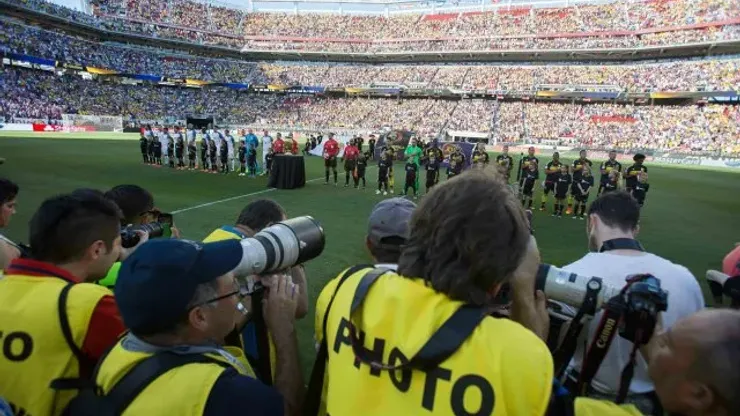On Friday night, the United States stepped onto its biggest soccer stage since the end of the 2014 World Cup against Belgium: The Copa American Centenario opener against Colombia at a sold-out Levi’s Stadium in Santa Clara, California.
The US felt they were ready. The emergence of Christian Pulisic and Darlington Nagbe, along with several strong pre-tournament friendly performances, engineered for Jurgen Klinsmann’s team an unusual sense of optimism.
It didn’t last long.
The US went behind off a corner-kick just seven minutes in, conceded again just before halftime as James Rodriguez converted a penalty given away by DeAndre Yedlin, and sunk to a 2-0 defeat.
Despite controlling large portions of the game, the Americans never really threatened. It was a hugely dispiriting display.
But it was hardly a face-plant. That’s the frustrating part. That performance – listless, disconnected, and unimaginative – is what we’ve come to expect from the United States under Klinsmann.
The US didn’t get played off the field. They mostly contained Colombia from the run of play, and could point to a series of individual mistakes from experienced players like Yedlin, Geoff Cameron, and Michael Bradley that decided the game.
All fair points. And Klinsmann predictably ran with that baton post-game, insisting that he was happy with how his team played.
But that’s a stance that only a coach and a country with zero belief in its team could adopt. The US’s performance wasn’t embarrassing, but it wasn’t anything beyond that.
Klinsmann has never met an excuse he didn’t like, but this performance was particularly moving. Open a major tournament at home in front of almost 70,000 people with two shots on target and a 2-0 loss? All is well. We just didn’t get the bounces.
Depending on your perspective, Klinsmann is either unfazed or delusional – not that those two conditions run counter to one another – but what’s as clear now as it ever has been is that the coach doesn’t the first clue tactically.
Jose Peckerman trotted out the same starting eleven that won Colombia’s last World Cup qualifier. Klinsmann named a team – of course – that had never played together before. It showed.
The Americans were unclear on when to press, unclear on their rotations in midfield, and devoid of ideas in the attacking third of the field.
Klinsmann named two center forwards in his starting lineup, Bobby Wood and Gyasi Zardes, and played neither of them at center forward. The result was nonexistent wing play.
Jermaine Jones, who looked a shell of himself, slammed Klinsmann’s game-plan post-game, saying that the team’s focus on helping Fabian Johnson – a midfielder playing fullback – defend Juan Cuadrado killed the US’ midfield.
He had a point. Jones, Bradley, and Alejandro Bedoya are all far better players than they showed on Friday night. The last time Bradley has played that abysmally? The 2014 World Cup.
There was no earthly reason for those three – who were all in good form with their clubs – to show so poorly. Colombia has a number of great players, but they don’t play central midfield.
Jones’ well-publicized anger after being substituted most likely had much more to do with how the game had progressed then the fact that he was withdrawn.
The US is, these days, decidedly less than the sum of its parts. In previous eras, the team had decidedly less talent, but it almost always overachieved. That’s why Klinsmann’s numbers look similar to those of his predecessors. It’s also part of the reason why his tenure has been such a disappointment.
Colombia has better players than the United States does, but the gap isn’t all that big. Where teams separate from the US is in coaching, in cohesion, and in direction.
Now, Tuesday’s game in Chicago against Costa Rica is a must-win for the United States. Klinsmann must decide whether to give in to the chorus calling for Nagbe and Pulisic, or ride with the team that lost to Colombia.
Either way, the US still won’t have any semblance of an identity when it takes the field next. The eleven players Klinsmann selects to face the Ticos will be, to a certain extent, playing with their hands tied behind their backs. Yedlin, at least, could take note.
This team doesn’t know how it wants to play, and it’s rarely put in a position to play well. The result, even on nights like Friday when the US isn’t losing to Guatemala, is rudimentary and boring soccer.
That the Americans gave up a game-winning goal on a set-piece hurts – along with the fact that they didn’t take better advantage of their own set-piece chances – but it’s not shocking.
The US has always been best when bought in and playing tenacious, tough soccer. Against Colombia, Klinsmann’s team looked limp and confused. The fact that they didn’t look completely incompetent speaks more to their individual potential than any collective achievement worth hailing.
This team can pick up the pieces on Tuesday night, playing, as they often do, with a chip on their shoulder. Friday will go down as another opportunity squandered – and at point in the Klinsmann era, that shouldn’t surprise anyone.
So at the start of what should be a festive summer, the mood around US soccer turns ever bleaker and darker.
200+ Channels With Sports & News
- Starting price: $33/mo. for fubo Latino Package
- Watch Premier League, Women’s World Cup, Euro 2024 & Gold Cup
The New Home of MLS
- Price: $14.99/mo. for MLS Season Pass
- Watch every MLS game including playoffs & Leagues Cup
Many Sports & ESPN Originals
- Price: $10.99/mo. (or get ESPN+, Hulu & Disney+ for $14.99/mo.)
- Features Bundesliga, LaLiga, Championship, & FA Cup
2,000+ soccer games per year
- Price: $5.99/mo
- Features Champions League, Serie A, Europa League & Brasileirāo
175 Premier League Games & PL TV
- Starting price: $5.99/mo. for Peacock Premium
- Watch 175 exclusive EPL games per season






